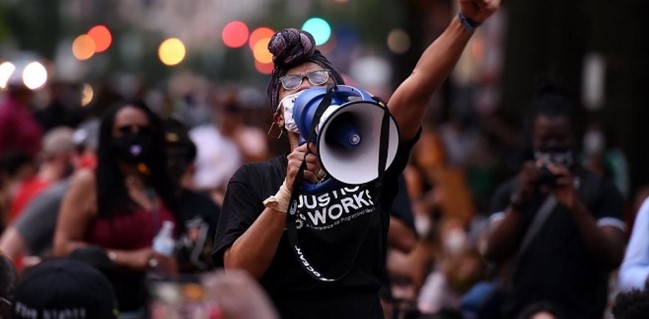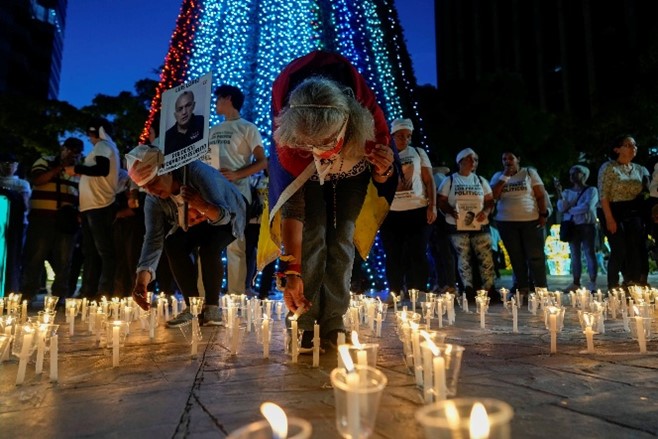This month we bring you news from Colombia, Venezuela, Peru, Paraguay, Argentina, Ecuador and Brazil.
Highlights are:
- Colombia: Amnesty has a new Urgent Action calling on President Petro to stop making stigmatising statements about civil society organisations in Catatumbo
- Venezuela: Venezuela has reached an agreement with the United States to resume the flights carrying migrants to Venezuela.
- Peru: Amnesty has issued a new Urgent Action calling on the President not to enact amendments to a law passed by the Congress.
- Paraguay: Amnesty has issued a new Urgent Action urging the Prosecutor’s Office to drop charges against environmental defender, Vidal Brítez.
- Argentina: An Urgent Action has been republished calling on Congress to guarantee an adequate standard of living for older people.
- Ecuador: Amnesty has condemned a decision by Ecuador’s Constitutional Court to dismiss an extraordinary action for protection brought by the “Guerreras por la Amazonia” (Warriors for the Amazon).
- Brazil and Paraguay: Brazil’s Supreme Federal Court has endorsed a settlement agreement in a lawsuit seeking redress for human rights violations suffered by indigenous communities in Brazil during construction of the Itaipú Dam.
COLOMBIA
 Amnesty has issued a new Urgent Action calling on President Petro to stop making stigmatising statements about civil society organisations in Catatumbo and instead be open to dialogue and to the participation of local organisations in the implementation of human rights centred solutions to the Catatumbo crisis. This follows a statement by President Petro on 3 March claiming that civil society organisations in Catatumbo were “permeated” and “subordinated” to armed groups. Amnesty said that, besides being unjustified and unacceptable, this statement endangered the members of these organisations and legitimised the violence that they, as well as the civilian population of Catatumbo in general, have been enduring since mid-January. This is a letter we sent at our April meeting you can use.
Amnesty has issued a new Urgent Action calling on President Petro to stop making stigmatising statements about civil society organisations in Catatumbo and instead be open to dialogue and to the participation of local organisations in the implementation of human rights centred solutions to the Catatumbo crisis. This follows a statement by President Petro on 3 March claiming that civil society organisations in Catatumbo were “permeated” and “subordinated” to armed groups. Amnesty said that, besides being unjustified and unacceptable, this statement endangered the members of these organisations and legitimised the violence that they, as well as the civilian population of Catatumbo in general, have been enduring since mid-January. This is a letter we sent at our April meeting you can use.
VENEZUELA
Russian President Vladimir Putin and Venezuelan President Maduro have agreed that the two countries are “strategic partners“, announcing that they intend to expand ties. It comes after US President Donald Trump’s decision to revoke a sanctions waiver permitting US company Chevron to operate in Venezuela. Putin is one of the few leaders to have recognized Maduro’s re-election, widely seen to be fraudulent.
Venezuela has reached an agreement with the United States to resume the flights carrying migrants to Venezuela. The agreement comes after a diplomatic argument between the countries after the United States deported Venezuelan migrants to El Salvador. The flights are being challenged. The US’s deportation drive is under challenge in US courts.
The Venezuelan army is alleging that it uncovered a US plot seeking to fabricate an incident in the Essequibo region, as a ruse for military action. The resource-rich Essequibo region, currently recognised as part of Guyana, is disputed by Venezuela. The claims come after US Secretary of State Marco Rubio travelled to the region and reaffirmed the US’s commitment to Guyana’s security.
The Urgent Action issued at the end of February remains active. At least four human rights defenders are currently arbitrarily detained for defending human rights: Javier Tarazona, detained in 2021; Rocío San Miguel, Carlos Julio Rojas, and Kennedy Tejeda, all three detained in 2024. They are prisoners of conscience and must be released immediately and unconditionally. We demand Nicolás Maduro ensures they are released as a matter of urgency. Whilst in state custody they should not subjected to torture and remain safe.



